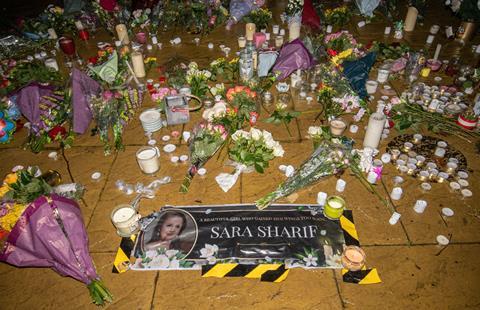The Ministry of Justice could come under pressure to fund and accelerate the expansion of ‘Pathfinder’ courts after an independent review of murdered 10-year-old Sara Sharif found the problem-solving child-led model could have made a ‘substantial difference’ in her case.
The Child Safeguarding Practice Review, published yesterday, highlighted a need for private law hearings to have the same status as public law hearings when considering the safety of children. ‘The current processes which focus on disputes between adults in private law hearings do not enable family court advisors to see children when making initial decisions or the consideration of the safety of the children involved,’ the review said.
The review noted the government’s intention to expand the Pathfinder pilot, with a child impact report and the provision of domestic abuse services to assess the risk at the information gathering and assessment phase integral to the approach. ‘This could have made a substantial difference to the way in which Sara’s situation was understood in the private law proceedings,' the review said.
The Pathfinder pilot began in Dorset and North Wales in 2022 and has since been expanded to other parts of Wales, West Yorkshire and the Midlands. However, the House of Commons public accounts committee has criticised the 'slow progress' rolling out the model.
The child safeguarding practice review found the overall process of the private law proceedings, when it was agreed that Sara should live with her father and stepmother, 'did not maintain sufficient focus' on the needs of the children, their cultural heritage and the father and stepmother’s ability to provide safe care.
'These proceedings were pivotal. From this point the child arrangements order that was made meant that Sara legally resided with father and stepmother. This decision had a powerful influence on professionals who subsequently came into contact with Sara and her father as the assumption was that the assessments carried out at that time had ensured that this was a safe and loving home. As a result, some of the unconscious and conscious red flags that might have alerted professionals (in school and C-SPA) to the abuse of Sara within the home were not recognised.

Read more
'The problem of perceptions of professional hierarchy driving practice has been well documented over several decades and it is evident that court decisions were perceived to be at the pinnacle of the hierarchy in this case.'
Sara's birthmother represented herself in court, with no interpreter present. The review said there was 'no obvious understanding of the impact of the power imbalance between birthmother, the court and father/stepmother, in the context of her experience as a survivor of domestic abuse'.
Recommendations include eradicating the potential for safeguarding risks not being recognised or addressed in private law proceedings. ‘This should be approached through the work of both local and national family justice boards to specifically focus on changing culture, policy and procedure that private law is not just about family dispute resolution in relation to the children involved but to recognise the risks in particular during separation to not just the adult but also the children,' the review said.
An interpreter should be made available when a parent’s first language is not English. If this is not possible and risks delaying proceedings, ‘the court should on all occasions ensure that the parents understand what is happening at each stage of the proceedings’, the review advised.
The review also found a 'perceived culture' among social workers of judges having higher regard for the advice given by children's guardians and experts.
This article is now closed for comment.



























5 Readers' comments